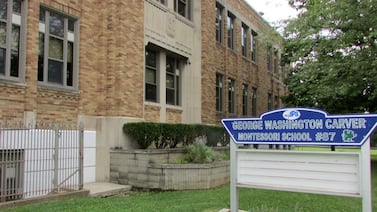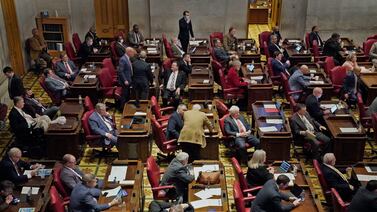In an attempt to generate millions of dollars more for K-12 education, Colorado lawmakers took a first step on Wednesday to equalize the varied tax rates that state residents pay to support school districts.
The bill, advanced on a 6-3 party-line vote out of the House Education Committee, would shift more of the cost to local taxpayers and free up state money, potentially allowing total education funding to increase.
Over the years, K-12 education has become the largest portion of the state’s general fund, limiting the state’s ability to invest in other priorities such as higher education, roads, and human services.
Democrats applauded the proposal’s goal to fix what they say is a longstanding issue, while Republicans held back support amid questions about whether the maneuver is constitutional.
State Rep. Tony Exum, a Colorado Springs Democrat, said House Bill 21-1164 tries to right a decades-old wrong.
“This is a question about fairness,” he said. “And fairness shouldn’t have a time limit.”
The bill would gradually increase property tax rates over the next 19 years in school districts where the Colorado Department of Education has previously reduced tax rates, even after voters said they could stay the same.
In the past, the state Education Department interpreted the 1992 Taxpayer’s Bill of Rights and 1994 school finance law as requiring tax rates to go down. But subsequent court decisions cast doubt on that interpretation.
The tax rate is based on mills. A mill is worth $1 for every $1,000 of taxable home value.
In school districts that pay less than the maximum tax rate of 27 mills, the bill would increase property tax rates by no more than one mill a year until they returned to the rate previously approved by voters.
This change would generate an additional $91 million for K-12 education in the first year, according to legislative analysts, and could produce as much as $288 million a year in current dollars by the time it is fully implemented.
Most districts would see an increase to their total program funding next year, and would take on a greater share of funding schools, according to a legislative analysis. For example, Englewood Schools would see an increase of about $263,000 in its funding although the state would reduce appropriations by about $374,000.
The owner of a $400,000 home in Englewood currently pays about $626 a year to support the school district. Next year, with the mill levy a mill higher at 22.895, that same homeowner would pay closer to $655 — or more if their home value increased as well. Once Englewood reached the maximum of 27 mills, school district taxes on a $400,000 home would be $772 a year.
The Colorado Supreme Court must first rule on whether this proposal is constitutional. The Taxpayer’s Bill of Rights, or TABOR, requires voters to approve any new taxes, and this bill would raise taxes without a new vote.
Colorado lawmakers hope the state Supreme Court rules on the bill’s constitutionality before it gets final approval in the Senate, which would mean the new revenue would be included in this year’s budget deliberations.
Supporters say the same reasoning that led the court to uphold a 2007 mill levy freeze will lead justices to conclude this new mill levy proposal corrects a mistake and doesn’t represent a new tax. But opponents believe TABOR requires a new vote.
Wednesday’s committee hearing provides a preview of the debate to come.
Rep. Colin Larson, a Littleton Republican, said he wants the state Supreme Court to weigh in on the debate. He said he has a problem approving tax rate increases without taxpayer consent.
“This will have a tangible effect of increasing property taxes, and I think in our state people are used to voting on those property tax increases,” Larson said. “So I think while it might be by the letter of the law correct, I don’t know that it’s really in the spirit of what we’re used to.”
Meanwhile, Speaker of the House Alec Garnett, a Denver Democrat and sponsor of the bill, said school district mill levies were not properly applied in the past and don’t comply with the will of the voters to invest in schools.
“Year after year, this error has forced the state to backfill disproportionately more funding to our wealthiest districts while many districts struggle to appropriately fund education,” he said. “By fixing this mistake, we can slowly make school district funding more fair and bring it in line with what voters have approved.”
The bill has support from prominent education groups and districts across the state.
Representatives of Stand for Children, the Colorado Children’s Campaign and the Colorado Association of School Boards spoke in favor of the bill. And many school districts across the state support the bill.
“The bill offers an opportunity to revamp the constitutional tax code,” said Matt Cook, the school board association’s policy and advocacy director, “and fix our pack patchwork quilt of educational mill levies.”
Groups such as conservative education advocacy group Ready Colorado, however, have questioned the bill’s constitutionality. The group also said the bill doesn’t solve the larger problem of how Colorado shares money with local districts. The state’s formula sometimes sends more money to well-off districts than to poorer ones.
Nonetheless, House Majority Leader Daneya Esgar, a Pueblo Democrat and sponsor of the bill, said that the change is overdue.
“By passing this bill, we can correct an error that reversed the will of voters and which led to enormous inequities in how we fund public schools,” Esgar said. “This bill sets us on a long overdue path to ensure that every school district has the resources they need to offer the quality education every student deserves.”








